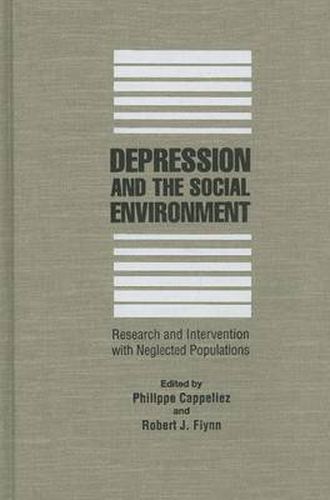Readings Newsletter
Become a Readings Member to make your shopping experience even easier.
Sign in or sign up for free!
You’re not far away from qualifying for FREE standard shipping within Australia
You’ve qualified for FREE standard shipping within Australia
The cart is loading…






While depression has been the subject of much research in the last decade, little attention has been paid to the influence of the social environment on depression and on mental health generally. This lack has become more conspicuous since the Canadian federal government began requiring that policy makers make social environment a primary consideration when designing new mental health programs. These essays explore the etiological role of the social environment, suggesting that for neglected populations - immigrants and refugees, native Indians, the unemployed, the physically disabled, the elderly, caregivers of the impaired elderly, children and adolescents, and women - depression has significant environmental roots. These populations and the manifestations of depression that they exhibit have been largely overlooked because the importance of the social environment itself has been insufficiently investigated. The contributors of most of the essays discuss empirical findings and, taken together, provide a unique in-depth review and analysis of the international literature on etiology, intervention, and policy implications. The approach developed in this volume has obvious significance for other mental health problems with social-environmental roots. In bridging the academic/practice divide, the authors address the interrelated concerns of researchers, practitioners, and policy makers. Philippe Cappeliez and Robert J. Flynn are both Associate Professors in the School of Psychology, University of Ottawa. This book is intended for researchers and policy makers in social welfare policy.
$9.00 standard shipping within Australia
FREE standard shipping within Australia for orders over $100.00
Express & International shipping calculated at checkout
While depression has been the subject of much research in the last decade, little attention has been paid to the influence of the social environment on depression and on mental health generally. This lack has become more conspicuous since the Canadian federal government began requiring that policy makers make social environment a primary consideration when designing new mental health programs. These essays explore the etiological role of the social environment, suggesting that for neglected populations - immigrants and refugees, native Indians, the unemployed, the physically disabled, the elderly, caregivers of the impaired elderly, children and adolescents, and women - depression has significant environmental roots. These populations and the manifestations of depression that they exhibit have been largely overlooked because the importance of the social environment itself has been insufficiently investigated. The contributors of most of the essays discuss empirical findings and, taken together, provide a unique in-depth review and analysis of the international literature on etiology, intervention, and policy implications. The approach developed in this volume has obvious significance for other mental health problems with social-environmental roots. In bridging the academic/practice divide, the authors address the interrelated concerns of researchers, practitioners, and policy makers. Philippe Cappeliez and Robert J. Flynn are both Associate Professors in the School of Psychology, University of Ottawa. This book is intended for researchers and policy makers in social welfare policy.